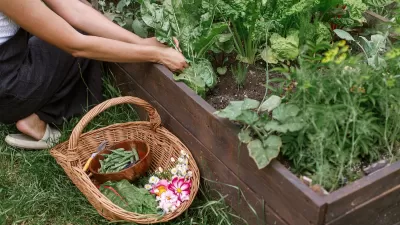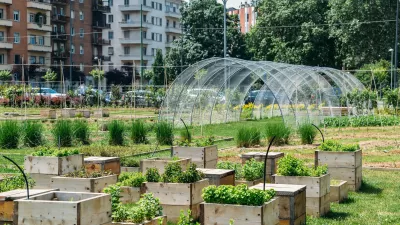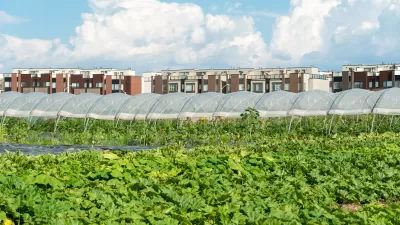A recent study found that a city could completely live off food grown from urban agriculture. Sharanbir Grewal, the study's author, discovered in his analysis of Cleveland that the city could produce up to 48 percent of the city's fresh produce.
Grewal's solution to increase the output from urban agriculture is based on converting vacant lots into farms, and residential lots producing crops.
"In the first scenario, Grewal found that if Cleveland converted 80% of its vacant lots into farms it could produce 22% to 48% of the city's demand for fresh produce (vegetables and fruits) depending on the type of farming. It could also produce 25% of poultry and shell eggs, and 100% of honey.
"In addition, if Cleveland used 80% of every vacant lot and 9% of every occupied residential lot, the city could generate between 31% and 68% of the needed fresh produce, 94% of poultry and shell eggs, and 100% of honey."
"Growing food in the city would also keep $29-115 million in the local economy."
FULL STORY: Could cities rely 100% on urban agriculture for their food?

Planetizen Federal Action Tracker
A weekly monitor of how Trump’s orders and actions are impacting planners and planning in America.

Congressman Proposes Bill to Rename DC Metro “Trump Train”
The Make Autorail Great Again Act would withhold federal funding to the system until the Washington Metropolitan Area Transit Authority (WMATA), rebrands as the Washington Metropolitan Authority for Greater Access (WMAGA).

The Simple Legislative Tool Transforming Vacant Downtowns
In California, Michigan and Georgia, an easy win is bringing dollars — and delight — back to city centers.

The States Losing Rural Delivery Rooms at an Alarming Pace
In some states, as few as 9% of rural hospitals still deliver babies. As a result, rising pre-term births, no adequate pre-term care and "harrowing" close calls are a growing reality.

The Small South Asian Republic Going all in on EVs
Thanks to one simple policy change less than five years ago, 65% of new cars in this Himalayan country are now electric.

DC Backpedals on Bike Lane Protection, Swaps Barriers for Paint
Citing aesthetic concerns, the city is removing the concrete barriers and flexposts that once separated Arizona Avenue cyclists from motor vehicles.
Urban Design for Planners 1: Software Tools
This six-course series explores essential urban design concepts using open source software and equips planners with the tools they need to participate fully in the urban design process.
Planning for Universal Design
Learn the tools for implementing Universal Design in planning regulations.
Smith Gee Studio
City of Charlotte
City of Camden Redevelopment Agency
City of Astoria
Transportation Research & Education Center (TREC) at Portland State University
US High Speed Rail Association
City of Camden Redevelopment Agency
Municipality of Princeton (NJ)





























